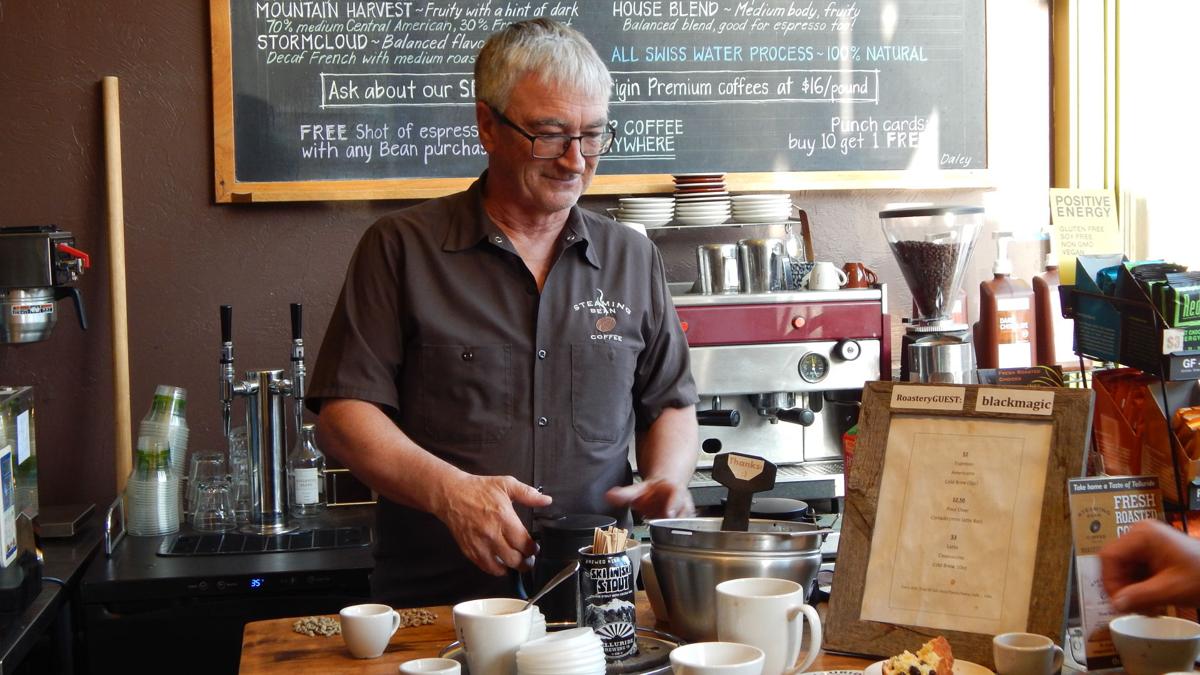Republished with permission from the Telluride Daily Planet.
By Suzanne Cheavens, Associate Editor Aug 25, 2019
The scheme for Telluride Coffee Roasters (formerly The Steaming Bean) to go net carbon neutral was hatched over — you guessed it — cups of coffee.
Adam Chambers is a climate scientist who volunteers his skills with the Pinhead Climate Institute. He’s passionate about bringing awareness and creating solutions to climate change. He’s also crazy about his coffee. The former Portland, Oregon, resident wasn’t sure he’d be able to find coffee on the level of the scene he’d left behind in The Rose City. And then he wandered into Mick Hill’s coffee bean roastery in Lawson Hill.
Hill knows a thing or two about coffee — he’s been in the business since 1980 and in Telluride since 1991 — and the two became friends over their shared love of all things brewed. Chambers, being the committed scientist he is, talk turned to the environment and it didn’t take much to convince Hill that his thriving business could become carbon neutral.
The goal is, Hill said, “To make a good product with the least amount of impact.”
The two calculated Telluride Coffee Roaster’s environmental impacts, taking into account Hill’s natural gas, electric and vehicle emissions, and came up with 45 tons of CO2 per year. The average American, Chambers said, discharges 16 tons of CO2 annually. TCR also ships bags of beans to consumers beyond the valley, but didn’t take that into account.
“We only wanted to offset what Mick can control,” Chambers said. “We’ve calculated their carbon footprint (electricity, natural gas for roasting, and vehicle delivery travel) and we are in the process of offsetting all of the emissions and making them net carbon neutral.”
The process, Chambers said, is inventory, reduce, offset. The offset is the purchase of 50 tons of carbon offsets from a farm in eastern Colorado.
“Carbon market transactions are based on rigorous science, allowing a supplier — in this case, a Colorado farmer — to reduce emission or remove emissions from the atmosphere,” Chambers said. “The carbon credits are then sold to a consumer (TCR) who is sending a demand signal for the climate solutions that the farmer can implement at a much lower cost. These are pure market fundamentals at work. Supply and demand.”
Hill had pondered other solutions to his energy use before going the offset route, including the solar array in Paradox that supplies power to the electricity grid.
“But I don’t use that much electricity,” he said. His monthly bill hovers around $100. Lights, the espresso machine and the grinder are the only things plugged in to the grid.
Hill also looked to his packaging, which is now fully compostable.
“I’m conscious about the environment,” he said. “The coffee industry is very vulnerable to climate change.”
Chambers concurred.
“Telluride Coffee Roasters is taking responsibility for their carbon footprint while recognizing that coffee is an agricultural product that is being impacted by global climate change.”
Offsetting one’s carbon emissions with a farmer is good business sense, Chambers said, as the agriculture and forestry industries are the only enterprises that “pull carbon from the air.” He counters those who might argue that purchasing offsets are a way to assuage climate guilt.
“Some people incorrectly think that carbon offsets are simply a method for wealthy people and corporations to ‘buy their way out of climate change guilt,’” he said. “This thinking is flawed and does not acknowledge the market-based economy fundamentals of our democracy … when carbon markets are purchased, the purchaser sends a signal to the supplier stating that the products that are generated have value.”
Hill is succinct. “I’m just trying to do the right thing.”
And he is the first local business owner to do so.
“He’s taking a leadership role,” Chambers asserted. “This is, competitively speaking, a much better product.”
Once known as The Steaming Bean, Hill has recently rebranded, incorporating his business’ location into the new name.
“It (Telluride) has cachet,” Hill said. “I’m always trying to push ahead and grow the business. It’s change; something new.”
Along with the extraordinary coffee varieties Hill offers — “I’m always looking for something interesting,” he said, offering an aged Sumatra — the roastery in Lawson Hill has an intimate counter for retail sales and morning java. Thursday morning the shop was humming with activity as employees arrived to package and roast beans, and customers, mugs in hand, came by to top off on the way to work.
An enormous, natural gas-powered Probat roaster dominates the main room and sacks of beans — which are actually fruits, not beans — are stacked everywhere. Telluride Coffee Roasters gear is available for purchase and TCR ships everywhere. His orange van awaits outside to deliver fresh supplies to the numerous local businesses that sell his coffee.
Chambers is not only a discerning fan of TCR coffee, but of Hill’s vision and commitment to doing what he can to aid in the battle against climate change.
“If every business in San Miguel county follows the leadership pathway of Telluride Coffee Roasters, we can accomplish the objectives stated on the shed as we drive into Telluride ‘Committed to Becoming Carbon Neutral,’” Chambers said. “The actions Telluride Coffee Roasters has taken are good business and good for the planet. I don’t see any downside. It’s a local and superior product that is net carbon neutral and part of the climate solution.”
